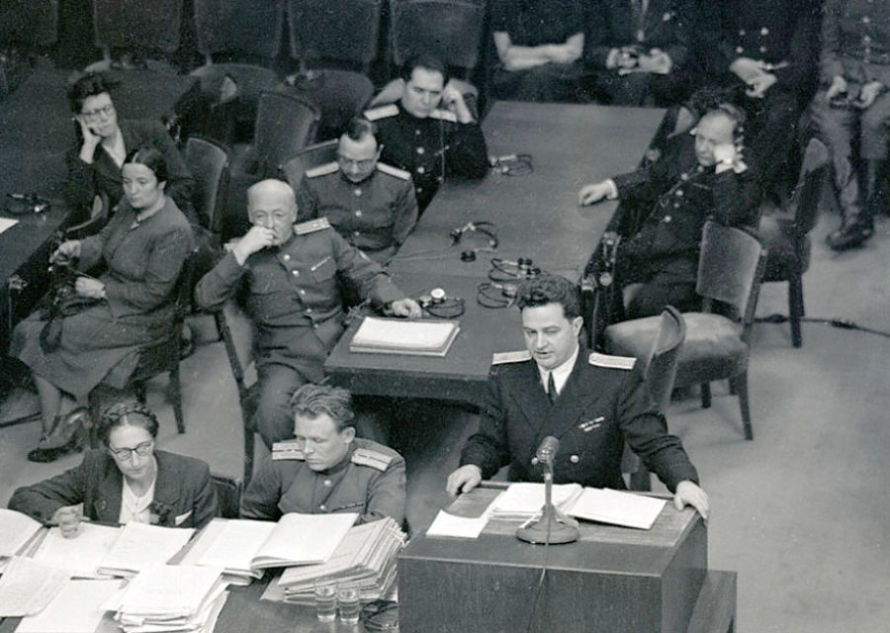In May 1946, the staff of the International Military Tribunal received shocking news: the assistant prosecutor for the USSR, General Nikolay Zorya, was found dead in his own bed - killed by a bullet wound to the head. This death still raises many questions - which have yet to be answered.
On the morning of 23 May 1946, Nikolay Zorya, an assistant prosecutor at the Nuremberg Trials for the USSR, was found dead in a rented apartment at 22 Guntermüllerstrasse. Zorya was lying in underwear in his bed, covered with a blanket. And there was a Walther pistol on the blanket.
The investigation lasted several days and ended with an official verdict handed over by the Soviet delegation to the American occupation authorities: Major General of Justice, State Councilor of Justice of the 3rd class, the 39-year-old Nikolay Dmitrievich Zorya died in an accident because of careless handling of weapons. It was assumed he was cleaning a pistol and accidentally pulled the trigger. The body was not sent to Moscow - it was buried in Leipzig.
Personnel file
Nikolay Dmitrievich Zorya was born in Kiev in 1907. As a child, he was taught French, painting and playing the piano. He did not remember his father, and after his mother died in 1921 he became a homeless child and ended up in a Moscow orphanage. At the age of 16 he entered the law faculty of Moscow University where he was apparently a gifted student. He came to the notice of the rector, Andrei Vyshinsky, and later Zorya worked under his supervision. After graduating from university, Zorya worked as an investigator in Pyatigorsk, Tambov and Voronezh, and rose to the rank of deputy chief prosecutor of railway transport. In 1939, the overly conscientious specialist was threatened with reprisals: he found that many sentences of sabotage during the Great Terror were imposed on the basis of fabricated evidence. The mobilisation which started in the same year saved Zorya - he took part in the Soviet-Finnish war with the rank of private, then he served as an assistant prosecutor throughout the Second World War.
He was awarded the Order of the Red Star and the Order of the Red Banner, medals for the defence of Stalingrad, for the defence of the Caucasus, and for the victory over Germany. In August 1944, he became an adviser of the Soviet Union's mission to the Polish Committee of National Liberation. In May 1945, he was appointed Assistant Prosecutor General for the USSR and was assigned to Nuremberg. A note has been preserved in his archives:
"It is with a feeling of joy that now I am going to carry out such an honourable mission - to accuse Hitler's criminals on behalf of the USSR, whose names are remembered with a curse all over the world."
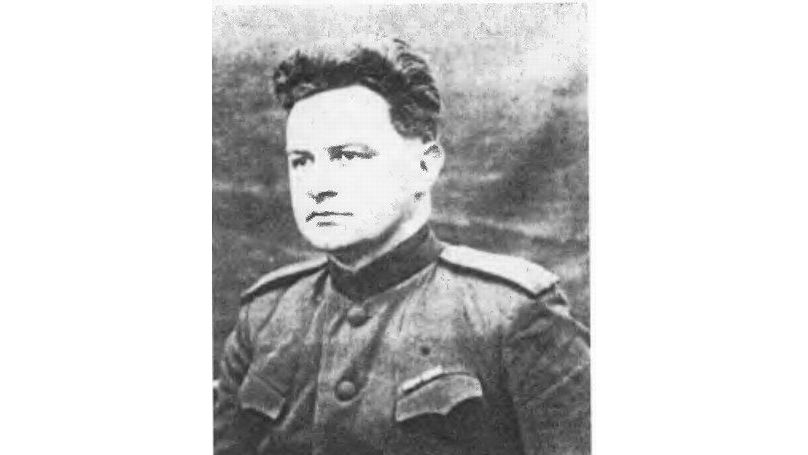
In September he took part in a meeting of the foreign ministers of the Allied States in London. Since February 1946, he represented the Soviet prosecution in Nuremberg in the "Aggression against the USSR" and "forced labour and enslavement in Germany" sections. He was also in charge of presenting the case for the "Katyn massacre" at the trials.
The interrogation of Field Marshal Paulus, at which it was said that the goal of Germany's war on the Eastern Front was to seize and colonise Soviet territory, plundering and exploiting the population and military resources, was among Zorya’s brightest achievements at the Nuremberg trials. Zorya was famous as a highly qualified lawyer and an outstanding speaker. Announcing his death, the US Army newspaper “Stars and Stripes” indicated the official reason (reckless handling of weapons) and added: “He was recently tasked with preparing for subsequent legal proceedings from the Russian side against the main war criminals. He was often mentioned as likely to succeed Roman Rudenko, the USSR’s chief prosecutor at the tribunal”.
The scene of the incident
The body of Nikolay Zorya was found by the Major of Justice Denisov. He came to visit him in his rented apartment to hand over the documents: Zorya had been ill for two days and stayed at home. Denisov knocked on the door for a long time. He saw an untouched breakfast tray on the table in the hall and discovered from the cleaning lady that Zorya had not left the room.
“At the first moment I thought that Zorya was in a swoon, because I knew he was sick. The German cleaning lady told me that the house has a step ladder and you can see what is going on in the room through the window. I went down to the courtyard, took a ladder, put it to the window of Zorya's room (the window was open). Climbing the stairs to the window, I saw Zorya's pale face on the pillow. I jumped into the room, and from the centre of the room I saw that the pillow and sheet were covered in blood, and Zorya had a pistol on his chest. I could tell that Zorya was dead.”
According to the report of the scene: “The body was covered up to the upper quarter of the chest with a blanket(...) In the area of the right temple was the entrance hole of a bullet wound, with a powder burn, measured 2.5 x 1.5 cm. The exit hole in the left half of the occiput is 8 cm from the left ear(…) The left arm was bent at the elbow and the left wrist was at the level of the face (near the right eye). The right arm was also bent at the elbow, with the right wrist lying on the chest. On the blanket (in the abdomen) there was a Walther pistol, caliber 7.65 mm. A spent bullet from a pistol of the same caliber was found on the blanket as well.
“The pillow and the sheet were covered with blood... Two notes were found in the pocket of a jacket hanging on the back of a chair (near the desk). These notes were seized and attached to this protocol. In addition, Zorya’s diplomatic passport, a night pass through Nuremberg and 170 rubles in Soviet money were found in the inner pocket of his jacket.
“His untouched dinner was on the round table. Pyjamas were thrown on an armchair near the table, in the pocket of which an unfinished note was found: "Before the party and the Soviet ... I am absolutely not ...". The note is attached to the inspection protocol.
“A significant amount of paper ash was found in the stove. Another spent bullet of a 12mm pistol was found on the windowsill. A deformed nickel-plated 7.65mm bullet had been removed from the board of the bookshelf.”
Dmitry Karev, assistant to the chief prosecutor for the USSR, who lived in the next room, did not hear the shot either at night or in the morning. “Perhaps I was fast asleep at the moment of the shot. In addition, I got used to the sound of gunfire at night: American soldiers often open fire at night for fun.”
Versions and rumours
A verdict of death by negligence precluded access to local forensic experts and was limited to notifying the officer on duty at the American military commandant's office. On the day Zorya's body was found, Roman Rudenko personally told this version to the American Prosecutor Robert Jackson and requested the body be immediately transferred to the Soviet zone of occupation, Leipzig. Jackson nevertheless sent two officers to the scene, who confidently spoke out in favour of the murder (most likely when Zorya was asleep). However, the permit to transport the body to Leipzig was issued, and the official version was sounded at a session of the tribunal.
Historian Alexander Zvyagintsev noted: “It was announced that Zorya died by accident while cleaning a weapon. Rudenko confirmed the version(...) There are several versions regarding his death. His son, Yuri Nikolaevich Zorya, expressed to me his opinion about the reasons his father died. He believes that they had not been properly researched. Nevertheless, the official version is that he was handling a weapon carelessly. And so far no one has conclusively refuted it.”
After 75 years, the death of Nikolay Zorya remains an unsolved mystery. As a result, several versions have been mooted; however, they are primarily based on guesswork rather than on facts.
The Soviet translator Tatyana Stupnikova in her memoirs “Nothing but the Truth. Nuremberg Trials. Memoirs of a translator" wrote that on the sidelines, employees who worked at the Nuremberg trials were speculating about murder or suicide, quoting what was then said by MGB Colonel Mikhail Likhachev (head of the special investigative brigade of the Main Directorate of State Security "SMERSH") - Stalin allegedly ordered that Zorya be killed like a dog and she asked herself: “Did he commit suicide when he felt that he had no other choice? Or was he asked to end his life, leaving his wife and children? Or maybe he was just shot by Soviet marksmen...? ”
Deputy American prosecutor Thomas Dodd believed that Zorya was killed by the NKVD because of his close contact with lawyers from the United States and Britain.
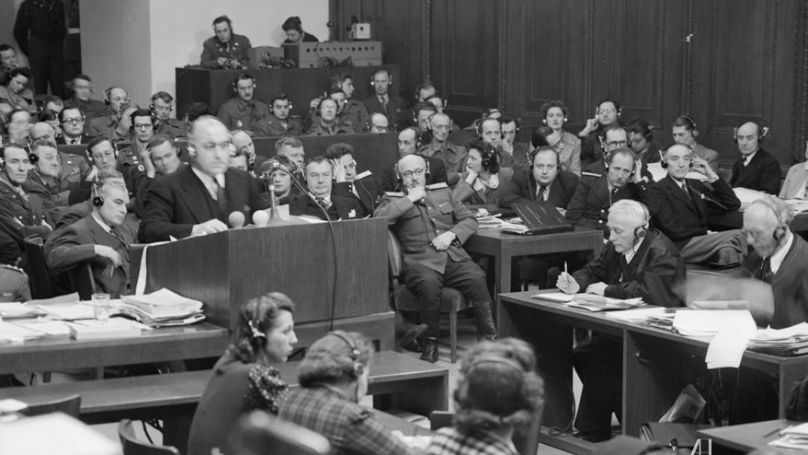
Researcher Francine Hirsch suggests that Zorya was not recalled to Moscow, but liquidated on the spot because of some urgent need, or he committed suicide before the return, because "he knew what awaited him".
Journalist Vladimir Abarinov included a number of quotes in his article “Death at Nuremberg: A White Spot in a Major Trial". For example, Dmitry Karev, a neighbour of Zorya, who had known him since 1935 through joint work in the USSR Prosecutor's Office, remembered him as a cheerful, optimistic and healthy person. But something happened to him in Nuremberg: “Zorya was extremely suspicious, suffered from persecutory delusions. Before delivering his reports and while carrying out service duties, he was very nervous and reacted painfully to every slight hint of shortcomings in his activities. Before his death, Zorya was particularly nervous for several days. So, having been given a bottle of wine from General Watson in return for a bottle of vodka that had been handed over to him (as part of an exchange of pleasantries after a reception in honour of Victory Day), Zorya, quite unexpectedly for all his friends, began to worry that this gift could be regarded as a sign of connection with foreign intelligence.”
Many years later Olga Svidovskaya (Tabachnikova), a translator at the Nuremberg trials, quoted the words of Mikhail Likhachev, that he had said after the death of Zorya: "He got confused and scared".
Unwanted questions
Most researchers who adhere to the version of violent death or suicide believe that an unexpected turn of events at the Nuremberg trials was the real reason: two of the most controversial topics discovered during the trial`s sessions were associated with Nikolay Zorya. The first one was the content of a secret protocol supplementing the Molotov-Ribbentrop Pact. The second one was the Katyn massacre.
Even before the start of the work of the International Military Tribunal, representatives of the prosecution from different countries agreed on unwanted topics that could not be touched upon during the trial. Among them were, for example, the behaviour of Great Britain during the war with the Boers and the Munich Agreement. Regarding the USSR, this list included the secret protocol to the Soviet-German non-aggression pact. Nikolay Zorya, among other things, was supposed to make sure that Joachim von Ribbentrop did not address this topic.
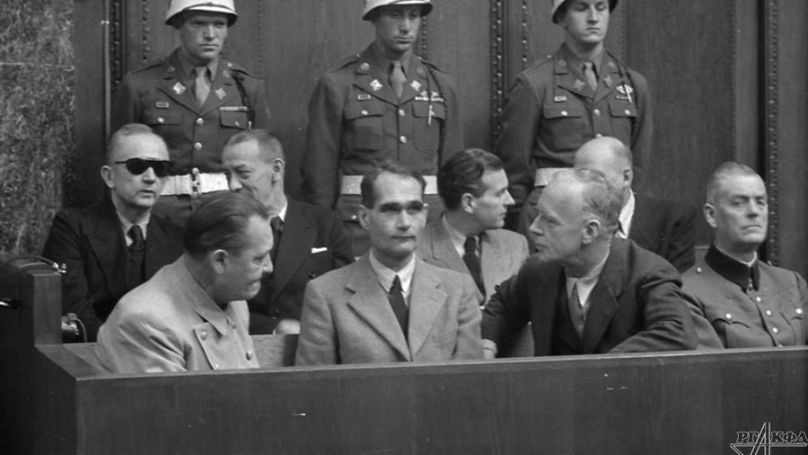
However, during Ribbentrop's interrogation, lawyer Alfred Seidl - despite categorical objections of the chief prosecutor for the USSR, Roman Rudenko - insisted on a detailed discussion of the secret protocol. The fragments cited by Seidl concerned the partition of Poland and cast a shadow on the reputation of the Soviet leadership. Ribbentrop and his secretary Weizsäcker orally restored the text of the secret supplement under oath. In the end, this topic was taken out of the discussion at the trial: the originals of the documents were burned during an air raid in 1944 in Berlin, and the uncertified copies that Seidl had were not included in the case. However, on 22 May, the text of the secret protocol was published by an American newspaper. The Soviet leadership immediately found it out. Presumably, Nikolay Zorya was blamed for the incident, as far as he failed to prevent the disclosure of documents compromising the USSR.
The second “bombshell” of the process was discussion of the shooting of Polish prisoners of war in the Katyn forest near Smolensk. It was the Soviet side that insisted on discussion of the case, having attached a number of documents to the case, according to which 11,000 Polish soldiers in the autumn of 1941 were shot by order of the German command. However, witness testimony revealed that the Katyn massacre took place even before the start of the Great Patriotic War.
Zorya was to appear before the tribunal specifically on the matter of the Katyn case. But, according to one of the modern versions, he was so confused by the new materials that he requested permission to fly to Moscow urgently for consultation with Vyshinsky. But the request was denied. The Katyn massacre was not included in the verdict of the International Military Tribunal.
The investigation is conducted by the son
Yuri Zorya, who was 17 on 20 May 1946, spoke with his father by phone for the last time as they discussed how he would join his father in Nuremberg after the final exams. Two days later, his father died and the family did not see the body; they only received personal belongings.
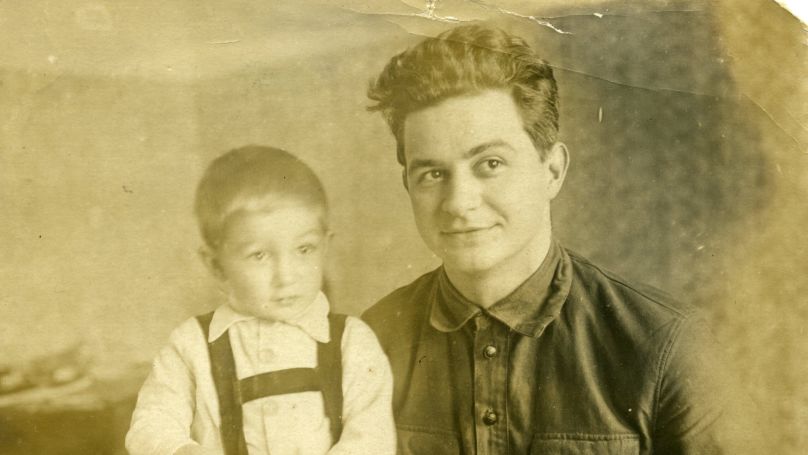
The news of the death of Zorya was a blow to his family; moreover, it was impossible to find out what exactly happened. Despite the official version, his wife and children were told that Zorya had shot himself and would be buried in Moscow as this was the responsibility of Stalin's secretariat. Then they were told that the funeral would be in Germany and relations would be sent there. And two days later it was announced that the funeral had already taken place to avoid publicity.
They were never given any official notices or documents. Yuri had to enter the naval school of the personnel department of the USSR Prosecutor's Office with a certificate that his father had died in an accident. The same was said in the death report issued in 1952 by the registry office of the Krasnopresnensky district.
The former military prosecutor of Leipzig, Dmitry Reznichenko, wrote to Yuri Zorya: “I cannot give the details of this tragic event, since at that time I was undergoing treatment in Czechoslovakia(…) My wife Ekaterina Petrovna was present at the funeral. I will describe to you the funeral according to her words(…) Stalin's office telephoned my apartment in Leipzig at 8pm, since we had a direct line. There was no one in the prosecutor's office at that time. Stalin’s people instructed us to have a zinc coffin made by morning, in which your father was to be sent to Moscow for burial. The order was fulfilled on time, and your father was sent to the airport, but my wife does not remember to which airport. At this time, the plane could not take off for three hours because of bad weather conditions, and at this time a new order was received from Stalin's people - to bury Zorya on the spot. And that was done. But my wife does not remember in which cemetery your father was buried. No expert examination was carried out before the funeral and during the preparations. There was no inscription on the grave.”
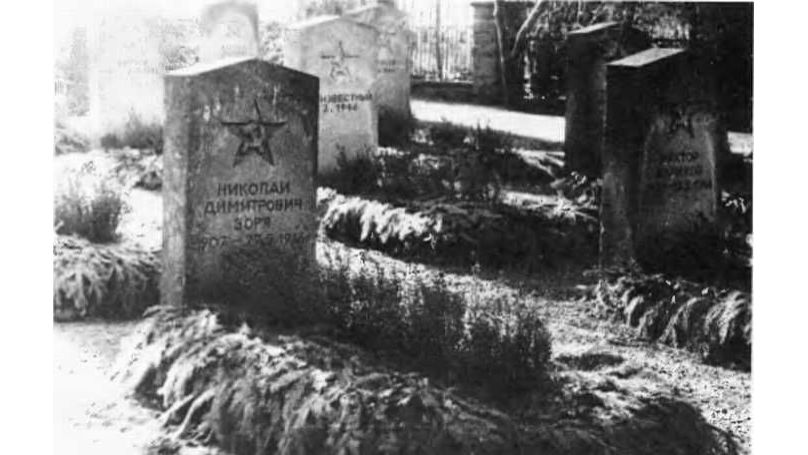
Subsequently, Yuri Nikolayevich managed to find out that the case initiated in 1946 to investigate the death of his father was kept in the archives of the Chief Military Prosecutor's Office, classified "Top Secret". In 1989, he obtained further information: according to the results, a spent bullet from a pistol that did not belong to Zorya was found at the place of his death; two witnesses gave false testimony, and two packages with a stamp of special importance then sent from Nuremberg to the Deputy Prosecutor General did not reach Moscow. However, the official version of the causes and circumstances of the incident remained unchanged.
A year after the death of Nikolay Zorya, his remains were extracted and cremated. The family found out about the location of the burial place only in the Eighties. The tombstone at the Eastern Cemetery in Leipzig had a wrong name and date of death; in the list of those buried, Zorya was considered a private. In 2016, Olga, Zorya's granddaughter, managed to have some corrections made: now the tombstone reads: "Nikolay Dmitrievich Zorya, 1907 – 23 May 1946, Major General of Justice".
Sources:
Vladimir Abarinov “Death at Nuremberg: A White Spot in a Major Trial"
Olga Zorya's interview in the "Dilettantes" program
